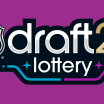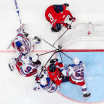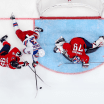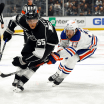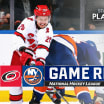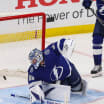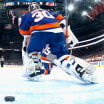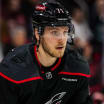TORONTO -- It all began so humbly. Ten skaters and two goaltenders gathered on the ice at Videotron Centre in Quebec City for a practice that lasted barely half an hour, in front of few onlookers. The team was missing half its players, 11 of them still traveling from Europe after Olympic qualifying, and its expected starting goaltender was about to be declared out of the World Cup of Hockey 2016 with an injury.
It was hard to believe in Team Europe then. This was an embryo, up against teams that had played together for years, teams with federations behind them and support systems and structures. This was a team with elite players, sure, but with some of them past their prime, with some yet to reach it.
Team Europe united, managed to build legacy
Players from eight countries bonded during run to World Cup final
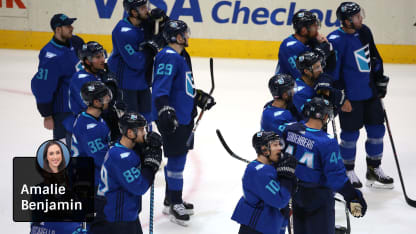
Team Europe didn't have all that the others did, all that Team USA did or Team Canada or Team Russia. It didn't have a history, as it so often reminded everyone: no past, no future.
But by the end of the World Cup, by the time it had outplayed Team Canada in most of two games, each a loss, by the time it had come three minutes from forcing a third game in the best-of-3 final, it had formed something that just about everyone had been unsure it would form: a team.
After it was over Thursday at Air Canada Centre, the 2-1 loss barely settled into the minds of a Team Europe that thought it would win this game until the very last moments, forward Frans Nielsen looked up at the assembled media, microphones and cameras in his face, and expressed his confusion, his wonder. His lip shook.
"We always thought we had a good team," Nielsen said, visibly emotional. "Everybody kept laughing at us. I don't know why."
That said something there.
It said something that Nielsen didn't see what the world saw when it looked at Team Europe, that he didn't understand the skepticism. It said something that there was a tremor in his voice as he spoke, that he cared about a team with players from eight European nations -- Slovakia and Slovenia, Norway and Denmark, Germany and France, Switzerland and Austria -- that found a way to play for country and for team, even though they didn't technically play for the former and they hadn't technically ever been the latter.
"It's just, I never seen anything like it," Nielsen said. "How 23 guys just get together in that way in so short a time and play so well together. I'm gonna …"
He paused, ever so briefly.
"I'm gonna remember this tournament the rest of my life," he said.
Some of that would be the sting, the pain of the way it ended, the pain of deserving more than they got. Team Europe played Team Canada better than any other team had in the World Cup, took it to the final minutes, the final moments.
Team Europe led through the first period and the second and more than three-quarters of the third, courtesy of a wrist shot from the left circle by defenseman Zdeno Chara at 6:26 of the first.
There was 3:35 remaining in the game when captain Anze Kopitar took a holding penalty. There was 2:53 remaining when Patrice Bergeron made a near-perfect deflection on a Brent Burns shot to tie it. There was 43.1 seconds left when Brad Marchand scored the winning goal, shorthanded.
The celebration was not to be Team Europe's.
There was disappointment in that. So much disappointment. So much emotion.
"Heartbreaking," defenseman Mark Streit said. "It's a very, very, very tough loss. It's tough to find the right words right now. But, heartbreaking."
And later, "This is going to hurt for a while."
But it was not only disappointment. There was pride, a sense of accomplishment, a love of country turned into a love of Team Europe.
Forward Marian Gaborik, who was injured in the semifinal against Team Sweden, playing the final two periods on a foot injury that will keep him out of the Los Angeles Kings lineup for eight weeks, spent Game 2 tweeting his support for his teammates. He was missing them. He was cheering them. He believed they should have another game.
They all believed that.
"They played their hearts out," coach Ralph Krueger said. "When you see the minutes on some of the guys and you see the effort of players that reached for their potential all the way through the game, it's extremely painful to see the final result.
"But I feel nothing but pride [in] the way this group performed today, the challenge they put up against Canada. This group just continued to surprise and beat the odds and beat the thoughts of everybody that was watching. I think we turned this into a [heck] of a final, which nobody expected."
Nobody did. But they were there, just the same, after Team USA had lost and Team Russia had been defeated and Team Sweden had gone home, all the teams that might have been picked to make it this far. They were gone, and Team Europe was not.
"I think we made it pretty special, going to the finals," Kopitar said. "Nobody thought we can do that. We pulled everything together, everybody was really invested. That's all we can really ask from the guys, from ourselves. I thought we definitely left a mark on this World Cup."
And though Team Europe might not have a future, it does now have a past. It has a history and a legacy and a place buried in the memories of the 23 players who played for it, the staff and coaches, the people who watched it come so close to defeating Team Canada, something that hasn't been done since 2010 in a best-on-best tournament.
Team Europe has a story. What started as a collection of players became more, much more.
"For sure, there was a lot of groups on the team in the beginning, the Slovaks, the Danes, the Germans and Swiss, sitting together at dinner," Nielsen said. "By the end, everyone was mixed and everybody is good friends. It was awesome to see how we got together and just came together as a team.
"Everybody just -- yeah, it was awesome. I'm never going to forget this."
